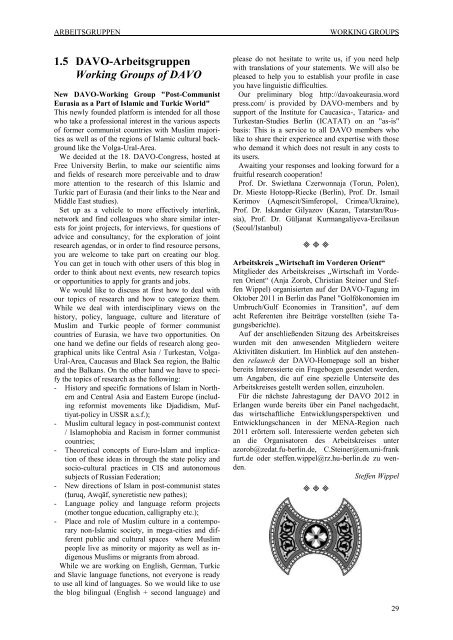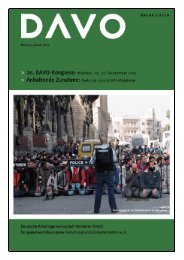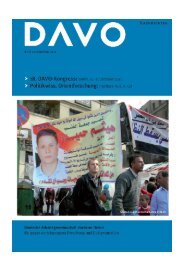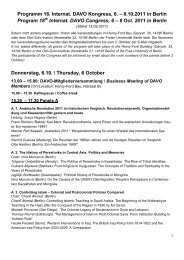4 Dissertationen und Habilita- tionen / Dissertations and Habilitations
4 Dissertationen und Habilita- tionen / Dissertations and Habilitations
4 Dissertationen und Habilita- tionen / Dissertations and Habilitations
Sie wollen auch ein ePaper? Erhöhen Sie die Reichweite Ihrer Titel.
YUMPU macht aus Druck-PDFs automatisch weboptimierte ePaper, die Google liebt.
ARBEITSGRUPPEN WORKING GROUPS<br />
1.5 DAVO-Arbeitsgruppen<br />
Working Groups of DAVO<br />
New DAVO-Working Group "Post-Communist<br />
Eurasia as a Part of Islamic <strong>and</strong> Turkic World"<br />
This newly fo<strong>und</strong>ed platform is intended for all those<br />
who take a professional interest in the various aspects<br />
of former communist countries with Muslim majorities<br />
as well as of the regions of Islamic cultural backgro<strong>und</strong><br />
like the Volga-Ural-Area.<br />
We decided at the 18. DAVO-Congress, hosted at<br />
Free University Berlin, to make our scientific aims<br />
<strong>and</strong> fields of research more perceivable <strong>and</strong> to draw<br />
more attention to the research of this Islamic <strong>and</strong><br />
Turkic part of Eurasia (<strong>and</strong> their links to the Near <strong>and</strong><br />
Middle East studies).<br />
Set up as a vehicle to more effectively interlink,<br />
network <strong>and</strong> find colleagues who share similar interests<br />
for joint projects, for interviews, for questions of<br />
advice <strong>and</strong> consultancy, for the exploration of joint<br />
research agendas, or in order to find resource persons,<br />
you are welcome to take part on creating our blog.<br />
You can get in touch with other users of this blog in<br />
order to think about next events, new research topics<br />
or opportunities to apply for grants <strong>and</strong> jobs.<br />
We would like to discuss at first how to deal with<br />
our topics of research <strong>and</strong> how to categorize them.<br />
While we deal with interdisciplinary views on the<br />
history, policy, language, culture <strong>and</strong> literature of<br />
Muslim <strong>and</strong> Turkic people of former communist<br />
countries of Eurasia, we have two opportunities. On<br />
one h<strong>and</strong> we define our fields of research along geographical<br />
units like Central Asia / Turkestan, Volga-<br />
Ural-Area, Caucasus <strong>and</strong> Black Sea region, the Baltic<br />
<strong>and</strong> the Balkans. On the other h<strong>and</strong> we have to specify<br />
the topics of research as the following:<br />
- History <strong>and</strong> specific formations of Islam in Northern<br />
<strong>and</strong> Central Asia <strong>and</strong> Eastern Europe (including<br />
reformist movements like Djadidism, Muftiyat-policy<br />
in USSR a.s.f.);<br />
- Muslim cultural legacy in post-communist context<br />
/ Islamophobia <strong>and</strong> Racism in former communist<br />
countries;<br />
- Theoretical concepts of Euro-Islam <strong>and</strong> implication<br />
of these ideas in through the state policy <strong>and</strong><br />
socio-cultural practices in CIS <strong>and</strong> autonomous<br />
subjects of Russian Federation;<br />
- New directions of Islam in post-communist states<br />
(ṭuruq, Awqāf, syncretistic new pathes);<br />
- Language policy <strong>and</strong> language reform projects<br />
(mother tongue education, calligraphy etc.);<br />
- Place <strong>and</strong> role of Muslim culture in a contemporary<br />
non-Islamic society, in mega-cities <strong>and</strong> different<br />
public <strong>and</strong> cultural spaces where Muslim<br />
people live as minority or majority as well as indigenous<br />
Muslims or migrants from abroad.<br />
While we are working on English, German, Turkic<br />
<strong>and</strong> Slavic language functions, not everyone is ready<br />
to use all kind of languages. So we would like to use<br />
the blog bilingual (English + second language) <strong>and</strong><br />
please do not hesitate to write us, if you need help<br />
with translations of your statements. We will also be<br />
pleased to help you to establish your profile in case<br />
you have linguistic difficulties.<br />
Our preliminary blog http://davoakeurasia.word<br />
press.com/ is provided by DAVO-members <strong>and</strong> by<br />
support of the Institute for Caucasica-, Tatarica- <strong>and</strong><br />
Turkestan-Studies Berlin (ICATAT) on an "as-is"<br />
basis: This is a service to all DAVO members who<br />
like to share their experience <strong>and</strong> expertise with those<br />
who dem<strong>and</strong> it which does not result in any costs to<br />
its users.<br />
Awaiting your responses <strong>and</strong> looking forward for a<br />
fruitful research cooperation!<br />
Prof. Dr. Swietłana Czerwonnaja (Torun, Polen),<br />
Dr. Mieste Hotopp-Riecke (Berlin), Prof. Dr. Ismail<br />
Kerimov (Aqmescit/Simferopol, Crimea/Ukraine),<br />
Prof. Dr. Isk<strong>and</strong>er Gilyazov (Kazan, Tatarstan/Russia),<br />
Prof. Dr. Güljanat Kurmangaliyeva-Ercilasun<br />
(Seoul/Istanbul)<br />
� � �<br />
Arbeitskreis „Wirtschaft im Vorderen Orient“<br />
Mitglieder des Arbeitskreises „Wirtschaft im Vorderen<br />
Orient“ (Anja Zorob, Christian Steiner <strong>und</strong> Steffen<br />
Wippel) organisierten auf der DAVO-Tagung im<br />
Oktober 2011 in Berlin das Panel "Golfökonomien im<br />
Umbruch/Gulf Economies in Transition", auf dem<br />
acht Referenten ihre Beiträge vorstellten (siehe Tagungsberichte).<br />
Auf der anschließenden Sitzung des Arbeitskreises<br />
wurden mit den anwesenden Mitgliedern weitere<br />
Aktivitäten diskutiert. Im Hinblick auf den anstehenden<br />
relaunch der DAVO-Homepage soll an bisher<br />
bereits Interessierte ein Fragebogen gesendet werden,<br />
um Angaben, die auf eine spezielle Unterseite des<br />
Arbeitskreises gestellt werden sollen, einzuholen.<br />
Für die nächste Jahrestagung der DAVO 2012 in<br />
Erlangen wurde bereits über ein Panel nachgedacht,<br />
das wirtschaftliche Entwicklungsperspektiven <strong>und</strong><br />
Entwicklungschancen in der MENA-Region nach<br />
2011 erörtern soll. Interessierte werden gebeten sich<br />
an die Organisatoren des Arbeitskreises unter<br />
azorob@zedat.fu-berlin.de, C.Steiner@em.uni-frank<br />
furt.de oder steffen.wippel@rz.hu-berlin.de zu wenden.<br />
Steffen Wippel<br />
� � �<br />
29





